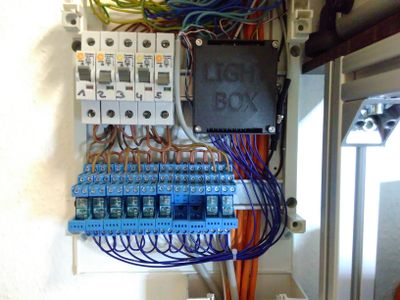Zeile 129:
Zeile 129: $ mosquitto_pub -h 10.23.42.10 -t "/room/light/w/command" -m "off"
$ mosquitto_pub -h 10.23.42.10 -t "/room/light/w/command" -m "off"
$ mosquitto_pub -h 10.23.42.10 -t "/room/light/w/command" -m "on"
$ mosquitto_pub -h 10.23.42.10 -t "/room/light/w/command" -m "on"
</pre>
== Skript ==
<pre>
#!/usr/bin/python
import mosquitto, os, socket, time
from threading import Thread
from time import gmtime, strftime
#File: /usr/local/sbin/light2mqtt.py
TCP_IP = '127.0.0.1'
TCP_PORT = 2001
BUFFER_SIZE = 1024
# Prometheus
#mqttBroker="10.23.42.31"
# BigBrother
mqttBroker="10.23.42.10"
mypid = os.getpid()
client = mosquitto.Mosquitto("RoomLights"+str(mypid))
# Zeit in Sekunden, in der die Lamen nicht geschaltet werden koennen (Schutz der Lampen und relais)
LAMPSLEEPTIME=5
pollerState = True
oldStates = {}
t = None
lampSleepProtection = {}
def processState(ls):
lightnr=1
global oldStates
global lampSleepProtection
werkstattState = "off"
for light in ls:
lightState = "on" if int(light) == 1 else "off"
if str(lightnr) in oldStates and lightState != oldStates[str(lightnr)]:
client.publish("/room/light/%s/state" % lightnr, lightState, 0, True)
print("%s Updated %s to %s" % (strftime("%Y-%m-%d %H:%M:%S", gmtime()), lightnr, lightState) )
# Zeit festlegen, solange die Lampe nicht mehr geschalten werden darf
lampSleepProtection[light] = int(time.time()) + LAMPSLEEPTIME
# Mindestens eine Lampe in der Werkstatt muss an sein
if lightnr == 5 or lightnr == 6:
werkstattState = "on" if lightState == "on" else werkstattState
lightnr+=1
# Aenderungen in der Werkstatt kommunizieren:
if 'w' in oldStates and werkstattState != oldStates['w']:
client.publish("/room/light/w/state", werkstattState, 0, True)
print("%s Updated Werkstatt state to %s" % (strftime("%Y-%m-%d %H:%M:%S", gmtime()), werkstattState) )
# Light ist das licht 1-6
# State ist h oder l
def switchLight(lights, state):
global lampSleepProtection
s = socket.socket(socket.AF_INET, socket.SOCK_STREAM)
s.connect((TCP_IP, TCP_PORT))
for l in lights:
if (l in lampSleepProtection and int(time.time()) < int(lampSleepProtection[l])):
print("%s Mqtt Command blocked for Lamp %s for %s seconds" % (strftime("%Y-%m-%d %H:%M:%S", gmtime()), l, str(lampSleepProtection[l] - int(time.time()) ) ))
else:
# Zeit festlegen, solange die Lampe nicht mehr geschalten werden darf
lampSleepProtection[l] = int(time.time()) + LAMPSLEEPTIME
s.send("ollpew%s%s" % (l, state))
time.sleep(0.2)
data = s.recv(BUFFER_SIZE)
s.close()
data = data.replace("\r", "").split("\n")
if len(data) > 3:
lightState = data[3].split(" ")[1]
print("%s Proccess via Mqtt for Lamp%s to %s" % (strftime("%Y-%m-%d %H:%M:%S", gmtime()), str(lights), state) )
processState(lightState)
else:
print("%s No answer from uC for Lamp%s to %s; only %s" % (strftime("%Y-%m-%d %H:%M:%S", gmtime()), str(lights), state, str(data)) )
def getStates():
s = socket.socket(socket.AF_INET, socket.SOCK_STREAM)
s.connect((TCP_IP, TCP_PORT))
s.send("ollpera")
time.sleep(0.2)
data = s.recv(BUFFER_SIZE)
s.close()
data = data.replace("\r", "").split("\n")
if len(data) > 2:
lightState = data[2].split(" ")[1]
print("%s Process by background thread" % strftime("%Y-%m-%d %H:%M:%S", gmtime()))
processState(lightState)
else:
print("%s No answer from uC getting its status; only %s" % (strftime("%Y-%m-%d %H:%M:%S", gmtime()), str(data)) )
def on_connect(rc):
#print("Connected with result code "+str(rc))
client.subscribe("/room/light/+/command")
client.subscribe("/room/light/+/state")
pollerState = True
def on_message(userdata, msg):
global oldStates
topic = msg.topic.strip("/").split("/")
lightNr = str(topic[2])
message = str(msg.payload)
if (topic[3] == "command"):
if (lightNr == "w" or int(lightNr) >= 1 and int(lightNr) <= 6) and message in ["on", "off"]:
lightState = "l" if message == "off" else "h"
# Lichter in Array gruppieren fuer die Werkstatt
if (lightNr == "w"):
lights = [5, 6]
else: # Sonst array mit einem Licht erstellen
lights = [ int(lightNr) ]
switchLight(lights, lightState)
elif (topic[3] == "state"):
# Nicht die Werkstatt aktualieren, das passiwert in getStates()
try:
if (lightNr == "w" or int(lightNr) >= 1 and int(lightNr) <= 6):
oldStates[lightNr] = message
except ValueError:
pass
def on_disconnect(userdata):
pollerState = False
#print "Disconnect"
def statePoller():
while True:
if pollerState:
getStates()
# Update the button only all half minutes
time.sleep(30)
client.on_connect = on_connect
client.on_message = on_message
client.on_disconnect = on_disconnect
client.will_set('/room/light/daemon/state', 'offline', 0, True)
t = Thread(target=statePoller)
t.start()
while True:
# print "Connect..."
client.connect(mqttBroker, 1883, 60, True)
client.publish('/room/light/daemon/state', 'online', 0, True)
while client.loop() == 0:
pass
# print "Reconnecting..."
time.sleep(60)
</pre>
Autostart im Raspberry:
Folgende Zeile in '''/etc/rc.local''' einfügen: (vor dem ''exit 0'' wenn vorhanden)
<pre>
# Start the monster deamon to rule the world
/usr/bin/python /usr/local/sbin/light2mqtt.py &
</pre>
</pre>
Dies ist ein Projekt, an dem momentan aktiv gearbeitet wird. Wenn du Fragen hast oder mitarbeiten möchtest, wende dich an
Ollo .
Schaltschrank Ueberschalter V2.0
Publikationen
Server
Hardware
Das ioBoard wird über das UART des Raspberry Pis angesprochen.
Die Kommunikation zum Raspberry erfolgt über Ethernet, es werden keine weiteren Schnittstellen benötigt.
Software
raspbian (wheezy)
ser2net
lighttpd (optional für Webclient)
Konfiguration
In der Konfigurationsdatei /etc/ser2net.conf von ser2net aktiviert man folgende Konfiguration. Alle weiteren können auskommentiert werden:
2001:raw:120:/dev/ttyAMA0:9600 NONE 1STOPBIT 8DATABITS -XONXOFF -LOCAL -RTSCTS
Webserver konfigurieren
$ cd /var/
$ sudo chown pi:pi www/
$ cd cd /var/www/
$ git clone https://github.com/C3MA/uberschalter
$ cd uberschalter/web/
$ make
Aktualiseren der lighttpd Konfiguration zu folgender (Muss ggf. erst installiert werden):
server.modules = (
"mod_cgi",
"mod_access",
"mod_alias",
"mod_compress",
"mod_redirect",
# "mod_rewrite",
)
#server.document-root = "/var/www"
server.document-root = "/var/www/uberschalter/web/www"
server.upload-dirs = ( "/var/cache/lighttpd/uploads" )
server.errorlog = "/var/log/lighttpd/error.log"
server.pid-file = "/var/run/lighttpd.pid"
server.username = "www-data"
server.groupname = "www-data"
server.port = 80
index-file.names = ( "index.php", "index.html", "index.lighttpd.html" )
url.access-deny = ( "~", ".inc" )
static-file.exclude-extensions = ( ".php", ".pl", ".fcgi" )
compress.cache-dir = "/var/cache/lighttpd/compress/"
compress.filetype = ( "application/javascript", "text/css", "text/html", "text/plain" )
# default listening port for IPv6 falls back to the IPv4 port
include_shell "/usr/share/lighttpd/use-ipv6.pl " + server.port
include_shell "/usr/share/lighttpd/create-mime.assign.pl"
include_shell "/usr/share/lighttpd/include-conf-enabled.pl"
$HTTP["url"] =~ "/cgi-bin/" {
cgi.assign = ( "" => "" )
}
cgi.assign = (
".cgi" => ""
)
Client
Android
Web
Auf dem RaspberryPi läuft auch Webserver um die Lampen zu steuern:
(Zu erreichen im Raum-Netzwerk unter lampi oder 10.23.42.140 .)
Lampenpositionen
Mqtt
Doku
Folgende Stati werden in MQTT geschickt:
/room/light/3/command off
/room/light/1/state on
/room/light/2/state on
/room/light/3/state off
/room/light/4/state on
/room/light/5/state on
/room/light/6/state on
/room/light/7/state on
/room/light/8/state on
/room/light/3/command off
/room/light/3/command off
/room/light/3/command on
/room/light/3/state on
Linux Befehl:
$ mosquitto_sub -v -h 10.23.42.10 -t "/room/light/#"
Eine Lampe kann mit folgenden Schema geschalten werden: /room/light/<id>/command (on|off) .
Unter Linux wurde das wie folgt getestet:
$ mosquitto_pub -h 10.23.42.10 -t "/room/light/3/command" -m "off"
$ mosquitto_pub -h 10.23.42.10 -t "/room/light/3/command" -m "on"
Und hier das Sammel-Topic für die Werkstatt:
$ mosquitto_pub -h 10.23.42.10 -t "/room/light/w/command" -m "off"
$ mosquitto_pub -h 10.23.42.10 -t "/room/light/w/command" -m "on"



